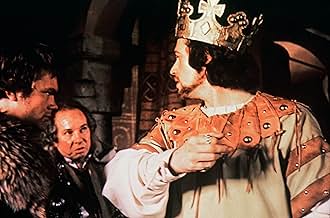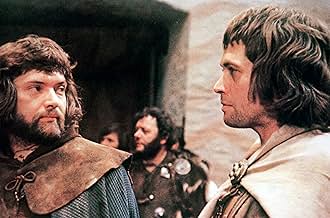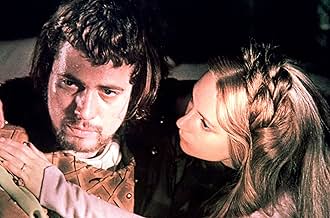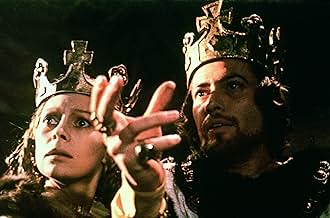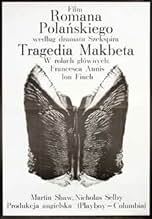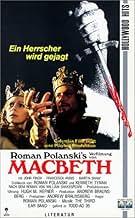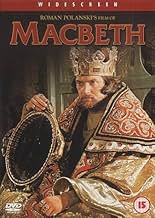IMDb रेटिंग
7.4/10
16 हज़ार
आपकी रेटिंग
एक क्रूर महत्वाकांक्षी स्कॉटिश सामन्त अपनी षडयंत्रकारी पत्नी और चुड़ैलों की तिकड़ी की मदद से सिंहासन पर कब्जा करता है.एक क्रूर महत्वाकांक्षी स्कॉटिश सामन्त अपनी षडयंत्रकारी पत्नी और चुड़ैलों की तिकड़ी की मदद से सिंहासन पर कब्जा करता है.एक क्रूर महत्वाकांक्षी स्कॉटिश सामन्त अपनी षडयंत्रकारी पत्नी और चुड़ैलों की तिकड़ी की मदद से सिंहासन पर कब्जा करता है.
- निर्देशक
- लेखक
- स्टार
- 1 BAFTA अवार्ड जीते गए
- 3 जीत और कुल 2 नामांकन
फ़ीचर्ड समीक्षाएं
Vehement and inch-perfect approach of Roman Polanski towards Shakespeare's greatest play "Macbeth". Polanski's absolute narrative technique and profound direction set the heinous deed of Macbeth and his tragic fate with elegance.
He brilliantly represents all Shakespearean symbols on the screen--- especially the floating "dagger", apparitions in the witches' den. Jon Finch powerfully portrays the downfall of Macbeth while Annis appears vivid struggling with her greed and conscience. Vibrantly, one of the mightiest adaptations from Shakespeare's :p
8/10__:D
He brilliantly represents all Shakespearean symbols on the screen--- especially the floating "dagger", apparitions in the witches' den. Jon Finch powerfully portrays the downfall of Macbeth while Annis appears vivid struggling with her greed and conscience. Vibrantly, one of the mightiest adaptations from Shakespeare's :p
8/10__:D
How does one do justice to one of the most nihilistic murderers in the history of drama? Even Richard the Third has a sense of humor. but once MacBeth buys into the witch's prophecy (which he doesn't have to do) - it's all straight to hell from there. Even his wife finally gets the idea that 'When you choose to ride the tiger, you don't get off' as one Confucian wit put it, long ago....
This is the film that put an end to the "high-school" Shakespeare that we all had to suffer through in the 1960s. That Shakespeare was dull, lifeless, meaninglessly conservative - everyone hated him. In America, we had heard about Peter Brooks, and about an all-nude MacBeth (which of course never happened, the reference was to the "out damn spot' scene, just as we see in this movie); and there were the legendary Orson Welles versions that were, unfortunately, wholly unavailable at the time. Then Zeffirelli made his Romeo and Juliet, showing Romeo's bare butt, even in the ad for the film, and we started getting the glimmer that Shakespeare had been a real person writing about other real people - then came Polanski's MacBeth.
I won't lie and tell you that this is the definitive MacBeth - or even that it's a really great movie - all of the actors seem like they are way over their heads in this material.
But Polanski's purely cinematic bravado pulls it off. Right from the beginning, watching a medieval warrior beat his opponent into a bloody pulp, we are drawn into a world where violence is the only truth we can believe - pretty much as MacBeth himself sees it.
From this point on, there was no turning back. The Shakespeare we inherit from this film may not be the one we want, but he is certainly a playwright of Elizabethan England (which the "high-school" Shakespeare never was).
That makes this film really important - at least until the definitive version actually gets made (and it hasn't, yet...).
This is the film that put an end to the "high-school" Shakespeare that we all had to suffer through in the 1960s. That Shakespeare was dull, lifeless, meaninglessly conservative - everyone hated him. In America, we had heard about Peter Brooks, and about an all-nude MacBeth (which of course never happened, the reference was to the "out damn spot' scene, just as we see in this movie); and there were the legendary Orson Welles versions that were, unfortunately, wholly unavailable at the time. Then Zeffirelli made his Romeo and Juliet, showing Romeo's bare butt, even in the ad for the film, and we started getting the glimmer that Shakespeare had been a real person writing about other real people - then came Polanski's MacBeth.
I won't lie and tell you that this is the definitive MacBeth - or even that it's a really great movie - all of the actors seem like they are way over their heads in this material.
But Polanski's purely cinematic bravado pulls it off. Right from the beginning, watching a medieval warrior beat his opponent into a bloody pulp, we are drawn into a world where violence is the only truth we can believe - pretty much as MacBeth himself sees it.
From this point on, there was no turning back. The Shakespeare we inherit from this film may not be the one we want, but he is certainly a playwright of Elizabethan England (which the "high-school" Shakespeare never was).
That makes this film really important - at least until the definitive version actually gets made (and it hasn't, yet...).
To say that this adaptation is a bit of a bloodbath is a bit of an understatement, but you cannot deny that this film from Roman Polanski is quite possibly the definitive film version of Shakespeare's play, which is very complicated to even contemplate transcribing to screen. The cinematography is excellent, as is the script. It is true that there are a lot of disturbing scenes, chiefly Lady Macbeth's nude sleepwalker scene and King Duncan's death. Roman Polanski should be commended for how much he managed to get into the film, and he somehow made it all effective. Any scene with the three witches, the murder of Macduff's family, plus the part when Macbeth sees Banquo's ghost was very well done.(I saw an amateur production of this, and not only was it disappointing, but that particular scene was the worst aspect of it) The performances were brilliant, Jon Finch(who did start off uncomfortable) is great on the whole as the treacherous thane-turned-king, and Francessca Annis was nigh-on-perfect as Lady Macbeth. And Martin Shaw was excellent as Banquo. From the suitably eerie opening scene, to the superb climax, this is a near-perfect adaptation, there were just some bits that were really disturbing to watch, that deserves more recognition. 9/10 Bethany Cox
10gerlynga
A few years after this was released in the USA, I convinced my high school English teacher to take our class to see it. (In the days before videos & vcr's, this involved renting a theater and print.) I was glad I did. It is certainly the most real and immediate filmed version of the play. The sets, costumes (or lack thereof), and casting all work to create an accurate depiction of "nasty, brutal, and short" 11th century life. And of course, there is the wonderful insight of Shakespeare's language to engage our modern sensibilities.
One can only thank Polanski for casting such relatively young actors as his leads. Kings lived and died young then, and had to be both excellent generals as well as administrators to succeed. Jon Finch is both athletic and impassioned enough to carry off the soldiering, and young and introspective enough to be moved by his wife both as a woman and co-conspirator. Of course Francesca Annis made a splash by doing the mad scene in the nude--but in medieval times, everyone slept in the nude, so it was certainly accurate to the times.
And as has been noted before, at least the castle keeps are cold, dark, and dirty. The communal sleeping arrangements, straw bedding, flaring smoky torches, seeping walls, and muddy yards all contribute to the historical accuracy of this production. The exterior of Bamburgh also works. And keeping with Shakespeare's light vs. dark metaphors, the mist, rain, and lowering skies combine to enhance the mood.
What happens in this "Macbeth" is as realistic as possible. So what happens offstage in the play, happens onstage in the film: the murders of Duncan, Banquo, Macduff's family. Murder is nasty and bloody and Polanski (having much experience of its results) makes sure we know it. Medieval Scotland was nasty and bloody as well, and if the film is accurate in depicting its setting, why not the action? And only Polanski has an ending that hints that violence and ambition didn't die with Macbeth's overthrow. All said, Polanski's film still has the most accurate medieval setting, engaging performance(s), and thrilling battles.
PS. For those interested in the real historical Macbeth, read Dorothy Dunnett's excellent biographical novel "King Hereafter". Dunnett is world renowned for her historical accuracy, and did much research to create not only a very plausible rendition, but a thoroughly interesting and entertaining story as well.
One can only thank Polanski for casting such relatively young actors as his leads. Kings lived and died young then, and had to be both excellent generals as well as administrators to succeed. Jon Finch is both athletic and impassioned enough to carry off the soldiering, and young and introspective enough to be moved by his wife both as a woman and co-conspirator. Of course Francesca Annis made a splash by doing the mad scene in the nude--but in medieval times, everyone slept in the nude, so it was certainly accurate to the times.
And as has been noted before, at least the castle keeps are cold, dark, and dirty. The communal sleeping arrangements, straw bedding, flaring smoky torches, seeping walls, and muddy yards all contribute to the historical accuracy of this production. The exterior of Bamburgh also works. And keeping with Shakespeare's light vs. dark metaphors, the mist, rain, and lowering skies combine to enhance the mood.
What happens in this "Macbeth" is as realistic as possible. So what happens offstage in the play, happens onstage in the film: the murders of Duncan, Banquo, Macduff's family. Murder is nasty and bloody and Polanski (having much experience of its results) makes sure we know it. Medieval Scotland was nasty and bloody as well, and if the film is accurate in depicting its setting, why not the action? And only Polanski has an ending that hints that violence and ambition didn't die with Macbeth's overthrow. All said, Polanski's film still has the most accurate medieval setting, engaging performance(s), and thrilling battles.
PS. For those interested in the real historical Macbeth, read Dorothy Dunnett's excellent biographical novel "King Hereafter". Dunnett is world renowned for her historical accuracy, and did much research to create not only a very plausible rendition, but a thoroughly interesting and entertaining story as well.
I remember watching this film in my Grade 11 English class when we were studying William Shakespeare's "Macbeth". Reading the story a couple of times, I rather enjoyed the classic tale to a degree. Whether or not it would convincingly translate to film, I, along with my class, was about to find out...with Roman Polanski's 1971 film adaptation, also produced by - HUGH HEFNER?!? As strangely amusing as the "Playboy" credit seemed in the opening credits, we were prepared for a very interesting take on the famous, violent play.
Shakespearean tragedies/comedies being translated to film are nothing new, of course. There have been some clear hits and misses over the decades - but fortunately, "Macbeth" does not fall into that latter "miss" category, for it is a tremendously underrated, very surprising, and overall competently made film. Roman Polanski is an excellent director here, and the acting, music, and effects (some of which - particularly the "dagger/murder" sequence - perversely amused my fellow classmates, who are obviously jaded by today's overblown, unsubtle, effects-laden "dramas") worked well for me. As well, the graphic violent and sexual nature of the film (which was also sometimes entertaining to the class, sadly) shocked me quite a bit. Of course, for a film made in 1971, Polanski's "Macbeth" isn't exactly "tame", if you will. Apparently it was rated X at the time, when the notorious film rating existed. I'm not sure if that's true or not, but it clearly wouldn't be surprising if it were, especially considering how intense this film can get - both physically and psychologically. It works extremely well as an old-fashioned action-packed thriller, and even to someone who knew the story fairly well, it was an exciting little soap opera to behold. The class really enjoyed it as well, I'm glad to say; even for all its "old" qualities (i.e. the twangy psychadelic-sounding music that plays upon the closing credits) it still achieved a certain charm that was impossible to deny.
One of the most impressive and enjoyable Shakespearean films I have ever seen, "Macbeth" deserves much more acclaim than scorn - for it is well-made, and enormously faithful to its original source, capturing all the details of ol' Scotland and its inhabitants with great care. It's a wonderful treat. Highly recommended.
Shakespearean tragedies/comedies being translated to film are nothing new, of course. There have been some clear hits and misses over the decades - but fortunately, "Macbeth" does not fall into that latter "miss" category, for it is a tremendously underrated, very surprising, and overall competently made film. Roman Polanski is an excellent director here, and the acting, music, and effects (some of which - particularly the "dagger/murder" sequence - perversely amused my fellow classmates, who are obviously jaded by today's overblown, unsubtle, effects-laden "dramas") worked well for me. As well, the graphic violent and sexual nature of the film (which was also sometimes entertaining to the class, sadly) shocked me quite a bit. Of course, for a film made in 1971, Polanski's "Macbeth" isn't exactly "tame", if you will. Apparently it was rated X at the time, when the notorious film rating existed. I'm not sure if that's true or not, but it clearly wouldn't be surprising if it were, especially considering how intense this film can get - both physically and psychologically. It works extremely well as an old-fashioned action-packed thriller, and even to someone who knew the story fairly well, it was an exciting little soap opera to behold. The class really enjoyed it as well, I'm glad to say; even for all its "old" qualities (i.e. the twangy psychadelic-sounding music that plays upon the closing credits) it still achieved a certain charm that was impossible to deny.
One of the most impressive and enjoyable Shakespearean films I have ever seen, "Macbeth" deserves much more acclaim than scorn - for it is well-made, and enormously faithful to its original source, capturing all the details of ol' Scotland and its inhabitants with great care. It's a wonderful treat. Highly recommended.
क्या आपको पता है
- ट्रिवियाMark Dightam, who was eleven when he controversially appeared full frontally naked as MacDuff's son, was not allowed to see the film when it was released because it had been classified AA and he was under 14 at the time.
- गूफ़The lyrics to the song that Fleance sings at Macbeth's banquet for Duncan at Inverness are taken from the poem "Merciles Beautè" by Geoffrey Chaucer. In the context of the film this extraneously inserted song is itself an anachronism, as Chaucer lived in the fourteenth century and Shakespeare's "Macbeth" historically takes place in the eleventh century.
- कनेक्शनFeatured in Aquarius: Two Macbeths/Hayward Gallery/Ravi Shankar (1972)
टॉप पसंद
रेटिंग देने के लिए साइन-इन करें और वैयक्तिकृत सुझावों के लिए वॉचलिस्ट करें
- How long is Macbeth?Alexa द्वारा संचालित
विवरण
- रिलीज़ की तारीख़
- कंट्री ऑफ़ ओरिजिन
- आधिकारिक साइट
- भाषा
- इस रूप में भी जाना जाता है
- Macbeth
- फ़िल्माने की जगहें
- Lindisfarne Castle, Holy Island of Lindisfarne, Northumberland, इंग्लैंड, यूनाइटेड किंगडम(Glamis Castle, Inverness)
- उत्पादन कंपनियां
- IMDbPro पर और कंपनी क्रेडिट देखें
बॉक्स ऑफ़िस
- बजट
- $31,00,000(अनुमानित)
- चलने की अवधि2 घंटे 20 मिनट
- रंग
- पक्ष अनुपात
- 2.35 : 1
इस पेज में योगदान दें
किसी बदलाव का सुझाव दें या अनुपलब्ध कॉन्टेंट जोड़ें



